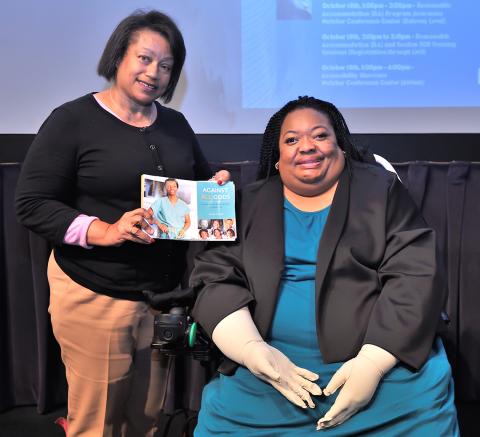People with Disabilities Are Creative Problem-Solvers, Emery Says

Photo: Marleen Van Den Neste
A disability is neither a weakness nor a barrier to leading a successful personal and professional life, said Crystal Emery at the National Disability Employment Awareness Month kickoff in Lipsett Amphitheater on Oct. 11.
Without thinking about it, she said, most people perceive a disability as a weakness or a flaw that interferes with a “person’s capacity to survive, contribute, succeed and triumph.” That’s not the case, however.
Employees with disabilities have a perspective that’s unique in the workplace, Emery said. They are problem-solvers and “some of the most brilliant people in your work environment.” Additionally, she said, they are mentally and spiritually strong.
People with disabilities “deserve equal opportunity to earn income and achieve independence just like everybody else.” Bringing them into the workplace requires that leaders advocate for diversity and inclusion. She defined inclusivity as recognizing that “someone has an intrinsic value, worth and talent without mentally adding qualifiers.”
Emery likened hiring people with disabilities to creating a new chemical compound. Just as adding a new substance changes a compound’s chemistry, hiring a person with a disability changes the workplace chemistry to become more diverse, inclusive and compassionate.
“If you don’t introduce a new substance to the mix, the compounds remains inert,” she said.
Leaders must identify barriers in the workplace that prevent people with disabilities from advancing in the organization. For example, federal employees voluntarily self-identify their disability. Emery said some people may choose not to do this out of fear that their disclosure would be used against them.
Employees with disabilities need more than their talents and creativity to overcome stereotypes and unconscious bias.
“Changing perceptions means we have to get the people who wield the power to stand with us, to demonstrate that it’s okay to bring us in to the fold,” Emery said. “We have to make it crystal-clear that we need them to do that.”
As a member of the disabled community herself, she cautioned against calling a person with a disability inspirational.

Photo: Marleen Van Den Neste
“They’re not looking for your pity,” she explained. They just want to do their job, be recognized for their work and be treated just like everyone else.
“I find it insulting when someone acknowledges me for my achievements and then minimizes it by saying ‘Oh, it’s amazing what you’re able to do despite your disability,’” Emery said.
She encouraged staff to be more humane and compassionate.
“You have to develop a sensitivity for your coworkers and create a safe place where those around you can experience—perhaps for the first time—what it’s like to be taken seriously and not treated with condescension,” she concluded. “As more of you join together and talk about this issue openly, change will begin to happen.”
